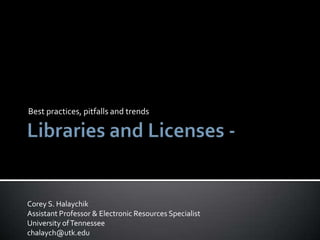Libraries and licenses: Best practices, pitfalls and trends
- 1. Best practices, pitfalls and trends Corey S. Halaychik Assistant Professor & Electronic Resources Specialist University of Tennessee chalaych@utk.edu
- 2.  An understanding of the five stages in the electronic resource licensing process.  An awareness of common pitfalls in the licensing process and best practices to counteract them.  An idea of current trends affecting the licensing of electronic resources.
- 3. Evaluation and Renewal Discovery and Investigation Support and Tracking Negotiation and Acquisition Activation and Implementation
- 4. Offer – Receive initial license from vendor Mutuality – Discuss terms and conditions Acceptance – Parties agree to terms Consideration – Payment exchanged for access Enforcement – Penalty phase Source: Association of Research Libraries. “Licensing review and negotiation.” 2003. Online Lyceum. ARL. Office of Leadership and Management Services. URL: http://www.arl.org/training/licensing.html
- 5. Pitfall Best Practice Going in blind Know what your users and institution want and need Not reading thoroughly Ensure you have ample time to read and ask questions Contract law trumps copyright Expect the worst and negotiate the best
- 6. Pitfall Best Practice Accepting “as is” Show no fear Failure to find common ground Know your “frenemy” and find a win-win Vague and confusing language Be specific and leave no doubts
- 7. Pitfall Best Practice Failure to launch Track progress Confusion after revisions Verify final version before sending payment Lapse in access Ask for trial access during finalization
- 8. Pitfall Best Practice Which version is being used Document each version of the agreement Paying too soon Ensure final agreement is signed by all before paying The check is in the mail Track progress to ensure vendor is paid on time
- 9. Pitfall Best Practice File and forget Perform periodic checks Looking the other way Address issues and hold vendors accountable Letting time slip by Continue to track and set reminders
- 10.  Negotiations  Be reasonable  Be ready to handle objections  Keep the users, usage, and access in mind  You want less barriers to access and legal protection  Make friends with your sales representative  They love to hear from you
- 11.  SERU  Publisher and library agree to follow well- established and widely-accepted common expectations in lieu of a formal license agreement  Standardization  Similar language used by vendors to allow licenses to be understood correctly and more visible to staff on the front line  Statistical data (COUNTER and SUSHI)
- 12.  PDA and Pay-Per-View  Licensing models are changing to address facilitation and portability between devices  Mobile Access  Availability, cost, and parameters of a mobile interface  Scholarly Sharing  Changes to address non-library mediated sharing
- 13.  Copyright  Recent trend has been a move by rights holders to place more limitations on sharing  Georgia State University case was seen largely as a decisive victory for fair use and libraries  Could lead to more defined limitation language showing up in agreements  Could also give libraries more leverage to negotiate favorable terms
- 14.  Copyright Crash Course:  http://copyright.lib.utexas.edu/l-cntrct.html  NISO SERU Homepage:  http://www.niso.org/workrooms/seru  LIBLicense:  http://www.library.yale.edu/~llicense/index.shtml  My email address  chalaych@utk.edu














